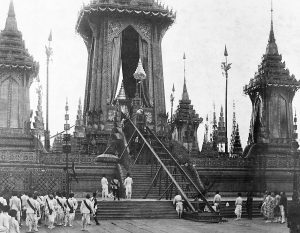Like most Asian nations that employ rigid historical education as a tool to cultivate national identity and official narratives, Thailand has made history mandatory in schools at both primary and secondary levels. But there is a case to be made that the teaching of history in Thailand lacks robustness compared to many of its Asian neighbors, considering that Thai history has been taught as a component of the social studies curriculum along with various other “subtopics” such as citizenship education, economics, geography, and religious studies.
The existing arrangement is about to change. In late October of this year, Prime Minister Prayut Chan-o-cha nudged Education Minister Treenuch Thienthong, urging her to push the plan to disentangle history from other aspects of social science forward – something that had been under discussion for years but saw no progress. Prayut’s words worked like magic. By the end of November, Thailand’s Board of the Basic Education Commission promptly gave their thumbs-up to the plan, aiming to teach history as an independent core subject by 2024.
The timing of this development is arguably quite strategic. It occurs at a critical period when Prayut, who has grown apart from his old allies in the ruling Palang Pracharath Party (PPRP), has been trying to revamp his image ahead of the upcoming 2023 general election. Prayut’s alleged new political party, Ruam Thai Sang Chart, is one that sits on the right, if not the far right, of the political spectrum. The party is expected to be less compromising than the PPRP, which is headed by Gen. Prawit Wongsuwan, an accommodationist who blends in with many political factions, including those in the opposition camp. Needless to say, the reconfigured history curriculum – sponsored by Prayut – to reinstall a seemingly lost sense of national identity among younger Thais will most likely appeal to conservative voters.
Some conservatives have indeed blamed Thailand’s inadequate and poor quality of history education for contributing to shaping the youth-led protest movement and their big rather than incremental demands for reforms surrounding the nation’s key institutions. Some conservative groups have even pushed for the reconstruction of citizenship education, involving lessons about duties and responsibilities, as another independent core subject.
In many ways, the line of thinking among conservative Thais parallels how the pro-establishment wing in Hong Kong views the so-called pro-democracy youth protesters. The former chief executive Carrie Lam, for instance, warned that failures to “correct” the young’s blurred understanding of Hong Kong’s constitutional status could enhance the social unrest.
There are certainly a number of conservative Thais who approve of the change, but are uncomfortable with the perceptible political motivation behind it. Critics, meanwhile, worry that “one-sided” history lessons that concentrate on memories of wars and grievances against external forces would be unproductive to foreign relations, just as a clash of historical narratives perpetually haunts Sino-Japanese relations. Some point out that “outdated” standardized history education that leaves little room for disputes could end up being counterproductive and “turn younger generations” away.
But perhaps the most cited argument against the move to make history an independent compulsory subject concerns Thailand’s shortage of and lack of support for history teachers. In 2008, the then secretary of Thailand’s Office of the Higher Education Commission revealed that the total number of students (nationwide) taking a history major at university (at bachelor, master’s, and Ph.D. levels) was 2,400 – an extremely tiny figure in comparison to other courses. Since then, the trend has remained largely unchanged.
This suggests that at the end of the day, social studies teachers will still be the ones teaching history, and hence there is no point in disintegrating these subjects into two core curricula. Ultimately, as the argument goes, the change would only add more burden to teachers, impose too much work on junior primary school kids, and limit the academic freedom of senior secondary students,
To ease skepticism, Education Minister Treenuch stressed that the restructured history course is intended to make learning more stimulating and thus boost critical thinking, not to forcefully instill patriotism. She further insisted that the ministry will not add extra teaching hours or request additional budget – a questionable statement.
It remains to be seen how exactly the change will play out in practice. Nevertheless, given the Prayut administration’s fixation with innovation and technology – as noted by Michael Montesano of the ISEAS-Yusof Ishak Institute, the Thai equivalent of the term “innovation” is used 68 times in the 74 pages 2018-2037 National Strategy – it is reasonable to assume that the updated history curriculum will heavily feature educational technology. At the ministry of education’s exhibition showcasing the teaching of Thai history at the end of last year, there was unsurprisingly an emphasis on virtual field trips through augmented reality and the use of online materials ranging from podcasts to animation. A focus on technology will inevitably raise questions concerning Thailand’s lingering digital divide.
Revision of history teaching is universally a sensitive and highly contested topic. The debate in Thailand, however, is a multilayered one that extends far beyond the issue of nationalism versus globalism.

































